Georgia Legislature Considers Railroad Safety Bill

Craig Camuso testified against House Bill 190, on behalf of CSX Transportation. The bill before the Georgia Legislature would mandate a two-person minimum when manning freight trains.
Emma Hurt / WABE
These days, there are usually two crew members manning freight trains. But just as car and truck companies are talking about autonomous driving technology, so are railroads. The next step could be a one-man crew, with a monitoring system. There’s a bill before the Georgia Legislature to prevent that and mandate a two-person minimum, which the railroad companies aren’t happy about.
The one-man crew concept worries conductors like Jake Gohagan from Savannah. He’s one of a group of trainmen who came to the Capitol to lobby for the bill, despite the risk of retribution from their companies.
One reason for two people? Fatigue.
“There’s a lot of times at night where we get called in the middle of the night,” he said. “We don’t have any set schedule — we’re called within two hours, we’ve gotta report to work.”
Most trainmen work on call, all hours of the day and night. And that means no set sleep schedule. What helps keep them awake?
“You’re having to talk to your conductor and your engineer back and forth all night to keep each other awake,” Gohagan said.

Plus, co-workers keep each other updated on trip details, like weather conditions and locations to slow down.
“Technology fails,” he said.
Another reason for the two-man crew? If a crossing barrier is broken, one person has to stop the cars, while the other drives the train, for example. Or if a train breaks down, he said, another pair of hands can make a big difference.
“If we don’t have two people up there, you’re going to be sitting there blocking any major intersection for hours upon end waiting on somebody to help you fix your problem,” Gohagan said.
With more freight being shipped, trains are getting longer, too, which makes them heavier and harder to operate, according to Matt Campbell. He’s a former railroad conductor and the Georgia legislative director for the transportation division of the International Association of Sheet Metal, Air, Rail and Transportation Workers.
“I hope more freight comes. I buy stuff on Amazon three times a day, bring it on,” he said. “But with that, we’re seeing across the country that trains are getting longer. The longer the train is, the harder it is to operate.”
“Instead of more trains, more shorter trains, doubling them up and running them longer is just making it harder for a train to reach A to B without issues,” he said. “And the issues are unexpected stops, blocking crossings, breaking apart, and all that will be amplified without that second person.”
Campbell testified before a Georgia House railroad subcommittee.
“To me, it’s a slap in the face,” he said. “That a railroad would even consider running trains that are miles long carrying millions of tons of explosive, destructive chemicals through your town, with only one person on board.”
“Safety is the most important factor of our job,” said Dwayne Massengale, a locomotive engineer from LaGrange. “We want to be able to do our jobs, to do the jobs well and to be able to do it safely.”
Massengale said the added technology is helpful, but is also distracting, “and so it’s more important to have those two people on board, to have an extra set of eyes. And to have that extra person when accidents do happen … who can go back, take care of the problem on the train, get the train moving or be that first responder for an accident that happens.”
Four states already have this regulation. The Federal Railroad Administration had considered enforcing the two-man minimum, but the Trump administration put it on pause.
Another part of the legislation would require railroads to have defibrillators on board each train.
The railroads do not support either part. Craig Camuso testified on behalf of CSX Transportation, as its state government affairs director.
Regarding the defibrillator idea, Camuso said, they aren’t necessary because the devices aren’t required in trucks by the Occupational Safety and Health Administration.
“In essence, [trains are] really not much different from the cab of an over-the-road truck,” he testified.
Opponents argue that trains are, in fact, different because they can be stranded in more remote places. Camuso also said the issue might be pre-empted by federal law, and a regulation that should be considered at the federal level.
Camuso acknowledged CSX is considering the one-man technology but said: “We are not going to change any technology until we are convinced that it is 100 percent safe.”
Camuso cited Gov. Larry Hogan of Maryland, who vetoed a similar bill last year. In his veto, Hogan wrote that the bill could increase shipping costs and deter carriers from operating in the state.
But to state Rep. Rick Williams, a Republican sponsoring the Georgia bill, it’s simple.
“It’s public safety. This is black and white,” he said. “I don’t know that I would ever get on an airplane that didn’t have a co-pilot. There’s a reason they put co-pilots on jet airplanes.”
His bill did not get a vote in subcommittee. It’s still unclear whether it will make it to the House floor.








